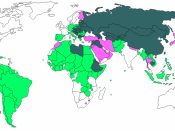IntroductionThere a more than a few measures used to evaluate a leader, and some of these measures include the individual's values, morals, intentions, freedom of choice, and the use of ethical and unethical behavior. Prominent leaders usually have a combination of strengths and weaknesses of the mentioned measures. An obscurity in assessing the morality of individual leaders is the prejudice inbuilt in determining which measure to use and the significance of the measure. The ultimate evaluation may be subjective by the traits of the judge as well as traits of the leader. Decisions about the ethics of a specific choice or action by at large considers the reason (ends), the degree to which behavior is steady with moral standards (means), and the penalty for one's self and others (outcomes) (Yukl, 2006).
Values are believed to be a powerful force following the behavioral reactions of people (Rokeach, 1973), employee problems in the workplace (Nord, Brief, Atieh, & Doherty, 1988), in addition to the major addition to unethical business practices (Barnett & Larson, 1987; Mitchell & Scott, 1990).
As our company is expanding and restructuring, I as a valued and veteran employee wish to present the type of leadership position that best suits me.
Ethical PerspectiveUpon completion of the Williams Institute Ethics Awareness Inventory self-assessment on the rEsource page, my score was ''O for Obligation. My determined ethical perspective states that I have a propensity to base my ethical perspective on an individual's duty or requirement to do what is morally right as these are main beliefs that represent what rational persons have to morally do. I mostly believe that conduct appeals to "conscience". In judging whether a person's dealings are ethical, I look to the objective behind his or her actions, rather than centering on results. From my perspective, ethical principles...


